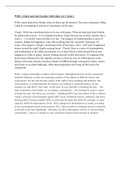Willy’s return and conversation with Linda Act 1 Scene 1
Willy comes back from Florida, where he had to go for business. He comes exhausted, telling
Linda he was phasing in and out of consciences on the road.
Clearly, Willy has a profound desire to be one with nature. When driving back from Florida,
he admires the scenery, ‘it’s so beautiful up there, Linda, the trees are so thick, and the sun is
warm. […] (I let) the warm air bathe over me’. The imagery of warmth portrays a sense of
comfort, delight and happiness, with willy profiting from the ‘beautiful’ landscape. Of
course, this imagery is deeply contrasting to that of his home, with a ‘sold vault of apartment
houses around the small, fragile-seeming home’. Clearly, there is a sense of claustrophobia
and confinement in the urban environment. It is evident that he restricts himself from true
happiness he finds in nature, instead, seeking material wealth and money. It is apparent that
he has been influenced by the capitalist society in which he lives in, following the social
dictum of his time, that the American Dream is fulfilled through consumerist culture, money
and luxury in an urban landscape, rather than minimalism and living off the land in the
countryside.
Willy’s reality profoundly conflicts with his hopes. Throughout his life, he has constructed
elaborate fantasies to deny the mounting evidence of his failure to fulfil his desires and
expectations. By the time the play opens, Willy suffers from crippling self-delusion. His
consciousness is so fractured that he cannot even maintain a consistent fantasy. In one
moment, he calls Biff a ‘lazy bum’. In the next, he says that Biff is anything but lazy: . His
later assessment of the family car is similarly contradictory—one moment he calls it a piece
of trash, the next “the finest car ever built.” Labelling Biff a lazy bum allows Willy to deflect
Linda’s criticism of his harangue against Biff’s lack of material success, ambition, and focus.
Denying Biff’s laziness enables Willy to hold onto the hope that Biff will someday, in some
capacity, fulfil his expectations of him. Willy changes his interpretation of reality according
to his psychological needs at the moment. He is likewise able to reimagine decisive moments
in his past in his later daydreams. Ironically, he asks Linda angrily why he is “always being
contradicted,” when it is usually he who contradicts himself from moment to moment.
,Willy
‘I’m the new England man. I’m vital in New England’ – 10
-The repetition mirrors the reaffirmations Willy has to constantly make, trying to support his
notion of the American dream through repetitive diction. It is clear he is dissollusioned,
believing that he plays an integral role in his company.
‘Biff is a lazy bum!’, ‘(he is) such a hard worker […] he’s not lazy’ – 11
-Labelling Biff with the epithet ‘lazy bum’ allows Willy to deflect Linda’s criticism of his
harangue against Biff’s lack of material success, ambition, and focus: success is not
happiness, it is material success.
-Then, denying Biff’s laziness enables Willy to hold onto the hope that Biff will someday, in
some capacity, fulfil his expectations of him. Willy changes his interpretation of reality
according to his psychological needs at the moment. He is likewise able to reimagine decisive
moments in his past in his later daydreams.
-Ironically, he asks Linda angrily why he is “always being contradicted,” when it is usually
he who contradicts himself from moment to moment.
Father
Father was very care free, whereas Willy is constrained and can’t move
around like his father did
The American dream has been corrupted, and have defined it as being
materialistic success
Father was much more productive, Willy = superficial
Reference to the Flute links to the God Pan, and this may also link to
Willy’s father. Unlink his father, Willy is confined by his environment and
separated from the natural world, represented by Pan.
‘it’s so beautiful up there, Linda, the trees are so thick, and the sun is warm. […] (I
let) the warm air bathe over me. And then all of a sudden I’m going off the road!’ – 9
, ‘The way they boxed us in her. Bricks and windows, windows and Bricks’ -12
-Repetition, and verb ‘boxed’ demonstrate the claustrophobia Willy feels. It is important to
note that much of the play’s action takes place in Willy’s home. In the past, the Brooklyn
neighbourhood in which the Lomans live was nicely removed from the bustle of New York
City. There was space within the neighbourhood for expansion and for a garden. When Willy
and Linda purchased it, it represented the ultimate expression of Willy’s hopes for the future.
-Now, however, the house is hemmed in by apartment buildings on all sides, and sunlight
barely reaches their yard. Their abode has come to represent the reduction of Willy’s hopes,
even though, ironically, his mortgage payments are almost complete. Experiences nature, but
unable to attain / access it. Just as the house is besieged by apartment buildings, Willy’s ego
is besieged by doubts and mounting evidence that he will never experience the fame and
fortune promised by the American Dream.
Arthur Miller:
‘Red Chevy’ – 13
-A symbol for the positive and happy past, which Willy years for, but he has to accept the
social dictum of his time period, forcing him to peruse material success.
Linda
‘You must not lose your temper with him (Biff)’
-First reference to Biff, and his volatile relationship with his father




